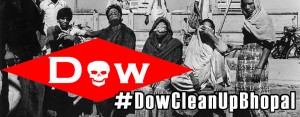The Dow Chemical Company must respond to court summons (show cause notice) tomorrow, Saturday 19th December, and attend the district court in Bhopal in relation to criminal charges pertaining to the 1984 Bhopal Gas Disaster which remain outstanding against its wholly-owned subsidiary the Union carbide Corporation (UCC).
Dow has ignored three previous, consecutive criminal court summons issued since July 2013: “We hope that the Indian and US governments have done their part to ensure that Dow complies with an official Indian court order,” said Aruna Chandrasekhar, Business and Human Rights Officer at Amnesty International India, “Dow must stop dodging the Indian justice system and ignoring survivors who have suffered from the toxic fallout of the disaster for over three decades now.”
Satinath Sarangi of the Bhopal Group for Information and Action pointed out that the notices against Dow Chemical have been issued by the Bhopal District Court due to the interventions by his organization, and not by the prosecuting agency the Central Bureau of Investigation. “Tomorrow we will see whether the CBI helplessly watches Dow Chemical ignore Court’s order a third time, or whether it summons the courage to take effective legal action against the criminal corporation.” he said.
After its 2001 acquisition, Dow has total control over the Union Carbide Corporation (UCC). Union Carbide, in turn, always retained a controlling interest in Union Carbide India Limited– the operator of the doomed pesticide factory at the time of the Bhopal Disaster- but Dow refuses to acknowledge any responsibility so far as any reparations toward the legacy of the disaster are concerned.
Union Carbide Corporation has never answered the criminal charges of ‘culpable homicide not amounting to murder’ and is a ‘proclaimed absconder’ from Indian justice and now Dow, the 100% shareholder in UCC, is required to explain why it should not produce it to the court.
Last week, Dow announced a $130 billion all-stock merger with US chemical giant DuPont, with the combined company to be named DowDuPont. “DuPont must know that the unresolved human rights and liability issues around Bhopal, including the outstanding criminal charges against UCC, will not go away because of the merger.” said Aruna Chandrasekhar.
Indeed, at the time of the Dow/ Carbide merger, Dow would seem to have supplied misleading information to the New York Securities and Exchange Commission in its public filings on the takeover. The merger agreement denied there was any criminal liability nor, indeed, any case:
“…any pending criminal prosecution exists against UCC. Article V of the Merger Agreement 214 states: “there are no (i) civil, criminal or administrative actions, suits, claims, hearings, investigations or proceedings pending or, to the actual knowledge of its executive officers, threatened against it or any of its Subsidiaries… except for those that are not, individually or in the aggregate, reasonably likely to have a Material Adverse Effect on it.” (214 Submitted with the Schedule 13D, as well as in other public filings before the Securities and Exchange Commission.)
In addition to the outstanding criminal charges, other legal cases surrounding the disaster remain unresolved- not least a forthcoming ‘curative petition’ in India’s Supreme Court that aims to address inadequacies within the 1989 civil settlement (U.S. $470 million).
The Indian Government’s official position is that the ‘gross inadequacy’ of the 1989 settlement with UCC resulted in an ‘irremediable injustice’. It is seeking additional compensation based on higher figures for the dead and injured which would require a settlement of as much as $8.1billion.
In 2014, at the occasion of the disaster’s 30th anniversary, Salil Shetty, Secretary General, Amnesty International had this to say: “Both the US and the Indian authorities have failed the people of Bhopal for too long. Successive Indian governments have failed to vigorously pursue justice in relation to the foreign corporation or clean-up the site…
“President Obama should urgently compel Union Carbide to appear in the Indian court; and Prime Minister Modi should vigorously pursue a full and fair compensation settlement for every victim. In September (2014) Modi and Obama made a joint statement saying the ties between the USA and India are rooted in their shared desire for justice and equality.
“It is neither justice nor equality when a US company can evade accountability for the deaths of thousands of people in India.”



